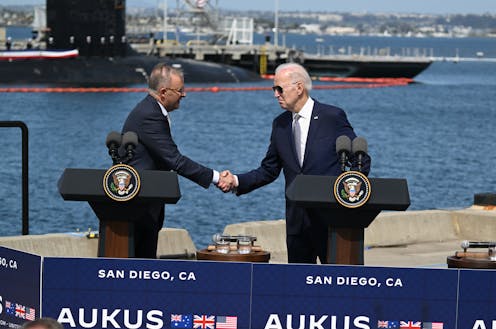As Australia signs up for nuclear subs, NZ faces hard decisions over the AUKUS alliance
- Written by Nicholas Khoo, Associate Professor of International Politics, University of Otago

Former Australian prime minister Paul Keating’s recent strident criticism[1] of the A$368 billion nuclear-powered submarine deal[2] announced under the AUKUS security pact will have little effect on Australian policy. Canberra’s deepening level of security cooperation is underpinned by a deep political consensus.
But the clarity of Australian policy stands in stark contrast with New Zealand’s position on AUKUS[3], the trilateral technology-sharing agreement between Australia, the UK and US. In fact, New Zealand’s AUKUS policy can be summed up in one word – ambiguity.
The establishment of AUKUS in September 2021 was met with an equivocal endorsement[4] by New Zealand. On the one hand, the prime minister at the time, Jacinda Ardern, was “pleased to see” the initiative, declaring she “welcome[d] the increased engagement of the UK and the US in our region”.
On the other hand, Ardern noted the country’s longstanding nuclear-free policy meant any nuclear-propelled submarines developed by our Australian ally would be prohibited from New Zealand waters.
After Tuesday’s joint AUKUS leaders’ statement[5] in San Diego by Australian Prime Minister Anthony Albanese, US President Joe Biden and British Prime Minister Rishi Sunak, it’s time to start counting the opportunity cost to New Zealand of maintaining this ambiguous policy posture.
Bets both ways
It may be surprising to hear, but Wellington’s AUKUS policy is ambiguous by design, reflecting a broader policy of “hedging”. This deliberately seeks to maximise the economic gains from trade with China, while supporting a US-constructed international order that aligns with New Zealand’s interests and values.
Unfortunately for New Zealand, the geopolitical environment that underpinned this policy has been torpedoed by the deterioration in US-China relations. It began during the Obama administration and has escalated during the Trump and Biden administrations.
Read more: Paul Keating lashes Albanese government over AUKUS, calling it Labor's biggest failure since WW1[6]
The creation of AUKUS is a reflection of this broader strategic environment. And it has a direct effect on New Zealand’s security in two respects.
First, New Zealand’s leading trade partner, China, views AUKUS as contributing negatively to regional security dynamics. And Beijing cannot be expected to placidly accept this démarche.
China responded to the formation of AUKUS with the China-Solomon Islands security agreement[7] in April 2022. What will its response be this time? It’s likely to involve some attempt to reduce Australian security, such as a Solomon Islands-style partnership with any number of states in the Pacific Islands Forum. This will have knock-on effects for New Zealand’s own security.
Regional instability
The possible scenarios are limited only by China’s capabilities and level of resolve to respond to AUKUS. As it stands, China’s foreign ministry spokesperson, Wang Wenbin, reacted critically[8] to the AUKUS leaders’ statement. According to Wang:
The latest joint statement from the US, UK and Australia demonstrates that the three countries, for the sake of their own geopolitical interests, completely disregard the concerns of the international communities and are walking further and further down the path of error and danger.
To put it mildly, such criticism is misplaced. Truth be told, while there is clearly an interactive dynamic at work, AUKUS is much more an effect of a deteriorating security environment than a cause of it.
Read more: AUKUS submarine plan will be the biggest defence scheme in Australian history. So how will it work?[9]
Like all countries, China has legitimate security concerns and interests. And it is clearly misleading, as many hawks in the US are doing, to paint China as an unvarnished threat to regional stability in the Indo-Pacific and beyond.
But it’s equally misleading to overlook China’s role in the increased regional instability over the past decade or more, which has led to the creation of AUKUS and the Quadrilateral Security Dialogue (QUAD[10]) involving Australia, India, Japan and the US.
Historic turning point
Second, the latest AUKUS developments have clear implications for New Zealand’s alliance with Australia, which is at a historic turning point. The principle at play here is clear – investment signals commitment, while lack of investment signals lack of commitment.
What is New Zealand’s level of commitment to the alliance? We will soon find out. The New Zealand Ministry of Defence is conducting a major review that will release its report after the 2023 general election.
Read more: Nukes, allies, weapons and cost: 4 big questions NZ's defence review must address[11]
It’s a fair bet Canberra is open to a serious discussion with Wellington on investing in a retooled ANZAC alliance. This would secure both countries’ national interests, not least their maritime, cyber and regional security.
Australia has chosen to invest in AUKUS. As Australian Defence Minister Richard Marles stated at a press conference in Canberra timed to occur immediately after Albanese’s joint ceremony with Biden and Sunak:
This is an investment in our nation’s security. It is an investment in our economy. And it is an investment that we cannot afford not to make.
AUKUS is both a catalyst and a mirror reflecting a swiftly changing strategic environment. New Zealand now needs to make some considered decisions on how to respond.
References
- ^ strident criticism (www.theguardian.com)
- ^ submarine deal (www.theguardian.com)
- ^ AUKUS (www.whitehouse.gov)
- ^ equivocal endorsement (www.newshub.co.nz)
- ^ leaders’ statement (www.reuters.com)
- ^ Paul Keating lashes Albanese government over AUKUS, calling it Labor's biggest failure since WW1 (theconversation.com)
- ^ security agreement (www.rnz.co.nz)
- ^ reacted critically (www.theguardian.com)
- ^ AUKUS submarine plan will be the biggest defence scheme in Australian history. So how will it work? (theconversation.com)
- ^ QUAD (www.whitehouse.gov)
- ^ Nukes, allies, weapons and cost: 4 big questions NZ's defence review must address (theconversation.com)

















